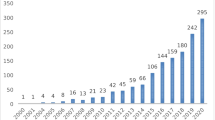Abstract
Reading comprehension is a valued skill worldwide. In Kenya, reading comprehension is taught through English textbooks. In this study, we analyzed the reading comprehension exercises in the English textbooks for Standard 4 and Standard 5. Results indicate a strong emphasis on questions that can be answered directly from the text and questions that connect to a reader’s background. A brief discussion of content is provided as well as limitations and future directions.




Similar content being viewed by others
References
Aaron, P. G. R., Joshi, M., Gooden, R., & Bentum, K. E. (2008). Diagnosis and treatment of reading disabilities based on the component model of reading. Journal of Learning Disabilities, 41, 67–84.
Afflerbach, P., & Cho, B. (2009). Identifying and describing constructively responsive comprehension strategies in new and traditional forms of reading. In S. Israel & G. Duffy (Eds.), Handbook of research on reading comprehension (pp. 69–90). New York: Routledge.
Anderson, L. W., & Krathwohl, D. R. (Eds.). (2001). A taxonomy for learning, teaching, and assessing: A revision of Bloom’s taxonomy of educational objectives. New York: Longman.
Anderson, R. C., & Pearson, P. D. (1984). A schema-theoretic view of basic processes in reading comprehension. In P. D. R. Barr, M. L. Kamil, & P. Mosenthal (Eds.), Handbook of reading research (pp. 255–291). New York: Longman.
Beerwinkle, A. L., Wijekumar, K., Walpole, S., & Aguis, R. (2018). An analysis of the ecological components within a text structure intervention. Reading and Writing, 31, 2041–2064. https://doi.org/10.1007/s11145-018-9870-5.
Beerwinkle, A. L., Owens, J., & Hudson, A. (2020). An analysis of comprehension strategies and skills covered within grade 3–5 reading textbooks in the United States. Technology, Knowledge and Learning. https://doi.org/10.1007/s10758-020-09484-0.
Berninger, V. W., Dunn, A., Lin, S. C., & Shimada, S. (2004). School evolution: Scientist–practitioner educators creating optimal learning environments for all students. Journal of Learning Disabilities, 37, 500–508.
Binks-Cantrell, E., Washburn, E. K., Joshi, R. M., & Hougen, M. (2012). Peter effect in the preparation of reading teachers. Scientific Studies of Reading, 16, 526–536.
Chall, J. S. (1983). Stages of reading development. NY: McGraw-Hill.
Chiu, M. M., McBride-Chang, C., & Lin, D. (2012). Ecological, psychological, and cognitive components of reading difficulties: Testing the component model of reading in fourth graders across 38 countries. Journal of Learning Disabilities, 45, 391–405.
CIA World Fact Book, “Kenya,” https://www.cia.gov/library/publications/the-world-factbook/geos/ke.html
Connor, C. M., Son, S., Hindman, A. H., & Morrison, F. J. (2005). Teacher qualifiations, classroom practices, family characteristics, and preschool experience: Complex effects on first graders’ vocabulary and early reading outcomes. Journal of School Psychology, 43, 343–375.
Cordeiro, C., Nunes, A., Castro, S. L., & Limpo, T. (2020). Teaching reading comprehension in Portuguese primary and middle schools. Technology, Knowledge, and Learning. https://doi.org/10.1007/s10758-020-09486-y.
Dudley-Marling, C. (2004). The social construction of learning disabilities. Journal of Learning Disabilities, 37, 482–489.
Fuller, B., & Clarke, P. (1994). Raising school effects while ignoring culture? Local conditions and the influence of classrooms, tools, rules and pedagogy. Review of Educational Research, 64(1), 119–157.
Glewwe, P., Kremer, M., & Moulin, S. (2009). Many children left behind? Textbooks and test scores in Kenya. American Economic Journal: Applied Economics, 1(1), 112–135.
Gough, P. B., & Tunmer, W. (1986). Decoding, reading, and reading disability. Remedial and Special Education, 7, 6–10.
Hebert, M., Bohaty, J. J., Nelson, J. R., & Brown, J. (2016). The effects of text structure instruction on expository reading comprehension: A meta-analysis. Journal of Educational Psychology, 105, 609–629.
Honig, B., Diamond, L., & Gutlohn, L. (2018). Teaching reading sourcebook (3rd ed.). Arena Press.
Hoover, W. A., & Gough, P. B. (1990). The simple view of reading. Reading and Writing: An Interdisciplinary Journal, 2, 127–160.
Kenya Institute of Curriculum Development. (2019). Grade 4 Volume One-March 2019. Available at https://kicd.ac.ke/cbc-materials/curriculum-design/#G4vol1 on January 5, 2021.
Kintsch, W. (1998). Comprehension: A paradigm for cognition. New York: Cambridge University Press.
McKenna, M., & Stahl, S. (2009). Assessment for reading instruction (2nd ed.). New York: Guilford Press.
Mucherah, W., & Herendeen, A. (2013). Motivation for reading and upper primary schools students’ academic achievement in reading in Kenya. Reading Psychology, 34, 569–593. https://doi.org/10.1080/02702711.2012.664249.
Mullis, I. V. S., & Martin, M. O. (Eds.). (2015). PIRLS 2016 assessment framework (2nd ed.). TIMSS & PIRLS International Study Center. https://timssandpirls.bc.edu/pirls2016/framework.html.
National Center for Education Statistics (NCES) (2020). Available at https://nces.ed.gov/surveys/international/ on January 4, 2021.
Pearson, D. P., & Johnson, D. (1978). Teaching reading comprehension. Rinehart and Winston, NY: Holt.
Piasta, S. B., Connor, C. M., Fishman, B. J., & Morrison, F. J. (2009). Teacher’s knowledge of literacy concepts, classroom practices, and student reading growth. Scientific Studies of Reading, 13, 224–248.
Piper, B., Bulat, J., Johnstron, (2015, March 4–7) Reading skill transfer across languages: Outcomes from longitudinal bilingual randomized control trials in Kenya and Haiti [Paper presentation]. Society for Research on Educational Effectiveness Spring Conference, Washington, D.C.
Smith, M. C. (1993). Change in reading ability and attitudes from childhood to adulthood: A life span perspective. In S. R. Yussen & M. C. Smith (Eds.), Reading across the life span Recent Research in Psychology. NY: Springer.
Snow, C. (2002). Reading for understanding: Toward an R&D program in reading comprehension. Santa Monica: RAND.
UNICEF, Basic Education and Gender Equality, /retrieved from: ”http://www.unicef.org/girlseducation/index_bigpicture.html.
Zuilkowski, S.S. & Piper, B. (2014, March 6–8). Improving reading outcomes in Kenya: First-year effects of the PRIMR initiative [Paper presentation]. Society for Research on Educational Effectiveness Spring Conference, Washington, D.C.
Author information
Authors and Affiliations
Corresponding author
Additional information
Publisher's Note
Springer Nature remains neutral with regard to jurisdictional claims in published maps and institutional affiliations.
Rights and permissions
About this article
Cite this article
Beerwinkle, A., McKeown, D. An Analysis of Reading Comprehension Questions in Kenyan English Textbooks. Tech Know Learn 26, 429–441 (2021). https://doi.org/10.1007/s10758-021-09502-9
Accepted:
Published:
Issue Date:
DOI: https://doi.org/10.1007/s10758-021-09502-9




